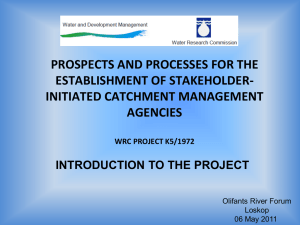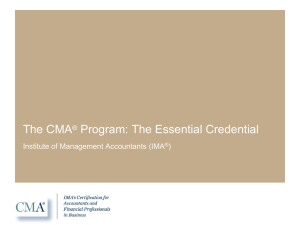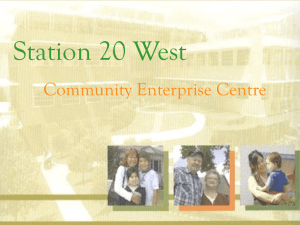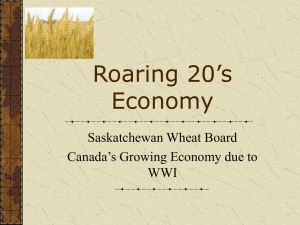Sustaning Saskatchewan`s Growth - Regional Planning for Growth
advertisement
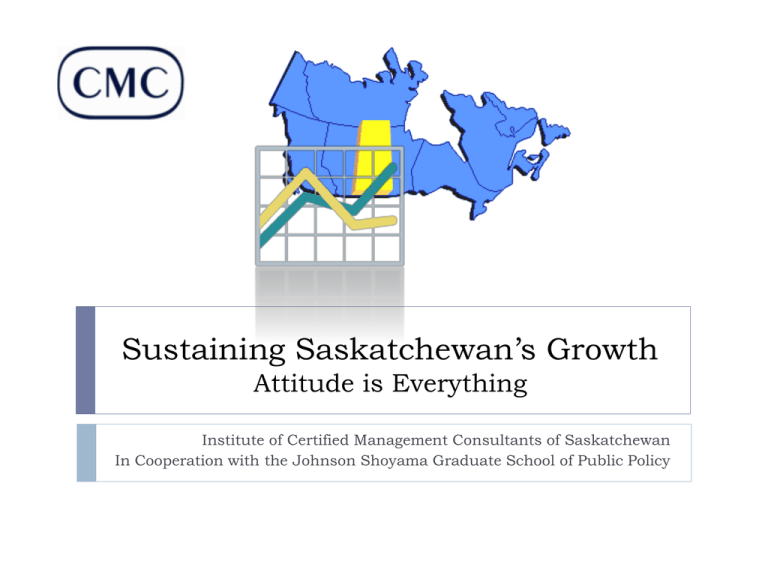
Sustaining Saskatchewan’s Growth Attitude is Everything Institute of Certified Management Consultants of Saskatchewan In Cooperation with the Johnson Shoyama Graduate School of Public Policy The World’s Premier Management Consulting Certification Contributing Firms & Consultants b Creative Group Conroy Ross Partners Deloitte Mandate Consulting McNair Business Development Paradigm Perspect Management Consulting Praxis Saskatchewan CMC Institute Johnson Shoyama Graduate School of Public Policy Study Objective: How to Sustain our Growth Sustain Saskatchewan’s Growth State of the Economy (Statistical Analysis) Attitudes Survey (Public Opinion) Challenges and Opportunities (Business Leaders) Residents believe the Future is Bright + = 85% Source: Praxis Analytics 2013 household survey Thinking about the next four years, how do you expect Saskatchewan’s economy will perform? Do you think it will … Most Think They Will Be Doing As Well or Better in Four Years And are Largely Pro-Business Economic Conditions Shape Attitudes Pioneers Building Together. Land of Opportunity Outward looking, Confidence in the future. Innovative. Welcoming immigration. Abundance of potential Population growth. Create a better life. Post Great Depression Risk averse, cautious, Success is envied; not applauded Adversarial: winners & losers Redistribution Dependent on Government Tolerate our hardship, Inward looking, better next year. Rural vs. Urban Shrinking & Stagnating Opportunity is elsewhere Out-migration. 2006: A Return to Pioneering Values Building Together. Regional interdependency. Community is the region. Partnerships for win/win. Land of Opportunity World needs what we have Outward looking, Confidence in the future. Global opportunities. within our reach. Innovative. Entrepreneurial. Welcoming immigration. International Immigration driving population growth. Outlook of abundance The place to invest Population growth. Population growth resumed. Create a better life. A prosperous future. Why the Change in Attitudes in Sask? Buoyant Economic Conditions = Optimism Income Levels Have Also Grown Economic Growth Driving Employment Growth Why all the Economic Growth? Exports! Growth of Exports 2003 to 2012 Source: Statistics Canada Population Gains relate to Global Commodity Super Cycles 80 % of Population Growth is in Sask Cities Communities Close to Regina & Saskatoon Growing Much Faster New Canadians are Driving Population Growth—Most Coming to Regina & Saskatoon Contribution of International Migration to Annual Population Change % of population at start of year Regina CMA, 201112, 1.9% Saskatoon CMA, 2011-12, 1.8% Regina CMA Saskatoon CMA Regina CMA, 2010Saskatoon CMA, 1.3% Regina11, CMA, 20092010-11, 1.2% Saskatchewan, 2011Saskatoon CMA, 10, 1.2% Saskatoon CMA, 12, 1.1% Saskatoon CMA, 2009-10, 1.1% 1.0% 2007-08, 2008-09, 1.0% Regina CMA, 200809,Saskatchewan, 0.9% Saskatchewan, 2010200911, 0.7% 0.7% Saskatchewan,10, 2008Saskatoon CMA,CMA, Regina 200709, 0.6% 2006-07, 0.6% Regina CMA, 2006Saskatchewan, 08, 0.6% 2007Saskatoon CMA, Saskatoon CMA, 07, 0.5% Saskatoon CMA, 0.5% Saskatchewan,08, 2006Saskatoon CMA, Regina CMA, 2004-05, 0.4% Regina CMA, 200420032005-06, 0.4% 2003-04, Saskatoon CMA, 0.4% 07, 0.3% 2001-02, 0.3% 0.3% 2004Regina CMA, 2005Regina CMA, 200104, Saskatchewan, 0.3% 05, Regina CMA, 2002Saskatchewan, 2003Saskatchewan, 20052002-03, 0.3% Saskatchewan, 2001200202, Saskatchewan, 0.2% 03, 0.2% 04, 0.2% 05, 0.2%06, 06,0.2% 0.2% 02, 0.2% 03, 0.2% Saskatchewan All of the Job Growth Also in the Cities Because Employment Intensive Industries are Urban Based Cities are Critical for Continued Population and Employment Growth Observations Saskatchewan’s recent success is due to both rural and urban economies: Exports originate in rural Sask. Most of the main supporting services, employment and housing growth is in the cities Sustaining the interdependency between rural and urban Sask is vital to Saskatchewan’s continued growth via: sustaining competitive resource industries, and Growing the cities since cities are the primary destinations to attract population, employment growth and investments in high value added production. Higher Value Added Needed—Cities Critical So Why The Need for Regional Cooperation? Sustaining Saskatchewan’s Growth and Competitiveness Sustained Growth is not Guaranteed Pursuing Opportunities, Addressing Challenges Cities Have the Ability to Become Globally Competitive at 500,000 Cities of 500,000 or more have avoided outmigration in the Northern Plains region of North America Cities become regional and national ‘engines of growth’ as they attract economic activity. Other than Atlantic Canada, Saskatchewan is the only Canadian province without a city of 500,000. Sustaining Saskatchewan’s growth requires larger cities. Challenges to Maintaining Growth Business leaders see four major challenges Increasing access to skilled labour and professionals Improving growth enabling infrastructure Addressing the rising cost of living and doing business Continuing to improve and evolve the policy environment Addressing these challenges is largely an urban based agenda because of the role of cities in: Attracting skilled trades persons and professionals to Saskatchewan Providing infrastructure and services to support business growth Creating local economies with sufficient scale to support growing business. Today’s Add Growth in300,000 500,000 RM Population inGrowth Towns 189 160 159 158 Thank You A higher level of management Consulting Study Findings – Attitude is Everything Findings: Unprecedented levels of growth and investment A material shift in public attitudes: ‘positive about the future’ Businesses are planning extensive developments and investments Cities capturing all the growth; larger cities are key to sustaining growth Only larger cities are able to attract and retain new skilled professionals Opportunities: Add more value to resources: manufacturing, processing, technologies, services Grow the population: Increase immigration, greater participation of First Nations Sustain the right policy environment: trade, taxation, training, promotion Barriers to Continued Growth: Shortages of: infrastructure, skilled labor, value added production, cultural industries Need more growth of cultural industries Fragmentation of governance, insufficient capacity of institutions

